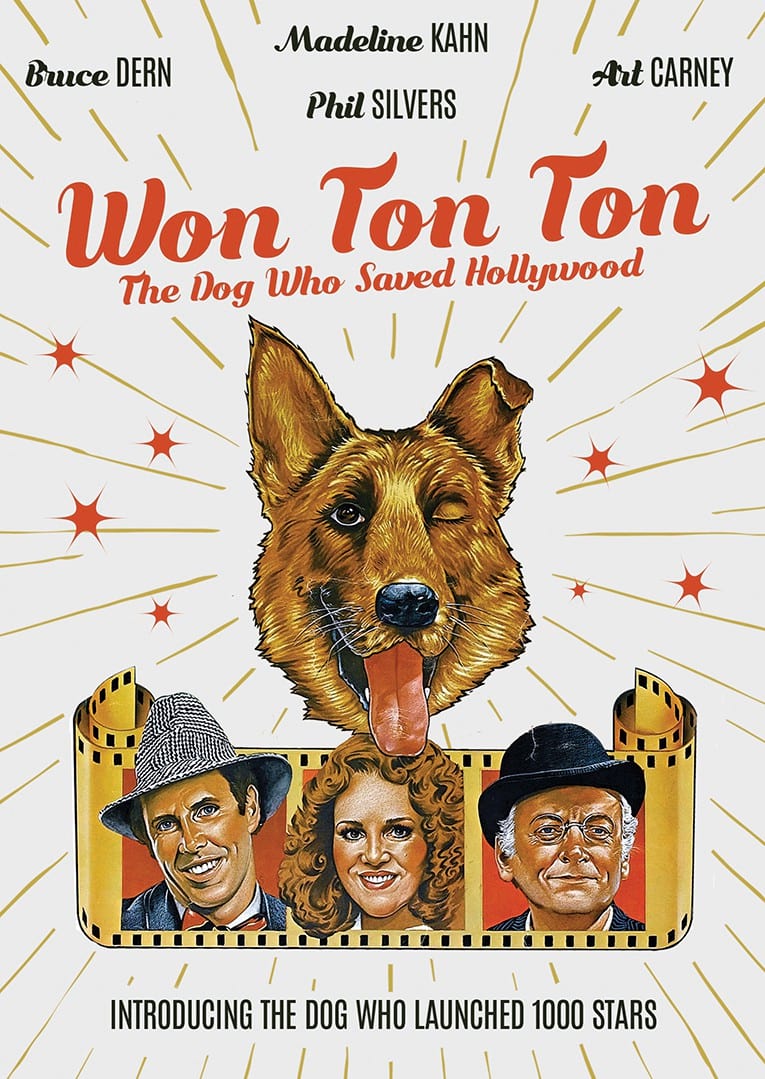THE AISLE SEAT - by Mike McGranaghan
"WON TON TON: THE DOG WHO SAVED HOLLYWOOD"

It's amazing how different PG movies were in 1976. Won Ton Ton: The Dog Who Saved Hollywood contains two homophobic slurs, an attempted rape, racially insensitive jokes, a scene where one major character turns to prostitution, and several shots of a completely naked child under the age of five. All this in a movie about a dog that prevents a movie studio from going bankrupt. Then again, that's just one of the things that makes this semi-forgotten picture, newly released to DVD and Blu-ray from Olive Films, an undeniably interesting watch.
Set in 1924, the film stars Bruce Dern as Grayson Potchuck, an aspiring screenwriter who continually pesters movie studio head J.J. Fromberg (Art Carney) with his big ideas. (The most clever joke is that his pitches sound like movies that were huge hits around the time Won Ton Ton came out, such as Jaws and The Exorcist.) Grayson's luck changes when he meets starlet Estie Del Ruth (Madeline Kahn), who has attracted the attention of a German Shepherd that follows her everywhere. Fromberg sees the dog in action and wants to cast him in a picture. Grayson promises to deliver the canine. Before long, the newly-dubbed Won Ton Ton is the biggest star in Hollywood – while Estie struggles to land an acting job.
Director Michael Winner (Death Wish) packs Won Ton Ton with about two dozen cameos from legendary Hollywood stars. Among them: Sterling Holloway, Virginia Mayo, Henny Youngman, Ricardo Montalban, Jackie Coogan, Ethel Merman, Phil Silvers, Milton Berle, Henny Youngman, and (really) Stepin Fetchit. Some of the cameos are bigger than others. Regardless, it's fun trying to spot them all.
Tonally, the movie tries to recapture the feel of early 20th century cinema. It has a lot of slapstick comedy, as well as a light, freewheeling tone. The story, loosely inspired by real-life canine celeb Rin Tin Tin, isn't very tightly constructed, though. Writers Arnold Schulman and Cy Howard want to cram in so many old-Hollywood ideas that it causes the plot to lose focus. They try to tell the story of how the dog's rise to stardom saves the studio, while also giving time to Grayson's career ambitions and Estie's frustration over not being able to find acting work. That would be okay if Won Ton Ton found a way to tie them together seamlessly, which it never does.
That said, the reason to see this film is to revel in its celebration of the earliest days of motion pictures. It may not be a “good” movie per se, but it is absolutely a fascinating time-capsule work. Seeing how cinema of the 1920s was honored in the 1970s will hold some appeal for anyone with even a remote scholarly interest in the history of the art form. You also get a typically sterling comedic performance from the late, great Madeline Kahn, plus the fun of seeing so many members of the silver screen's old guard pop up. Those things help to make up for the previously-mentioned material that, seen today, feels outdated, offensive, or ill-advised.
Won Ton Ton: The Dog Who Saved Hollywood looks pretty good on Blu-ray, given its age. There's some grain in the image, although that's perfectly befitting of the subject matter. Sound quality is also good.
For more information on this and other titles, please visit the Olive Films website.
Won Ton Ton: The Dog Who Saved Hollywood is rated PG, but contains language, homophobic slurs, and some mature thematic content. The running time is 1 hour and 32 minutes.
Buy a copy of my book, "Straight-Up Blatant: Musings From The Aisle Seat," on sale now at Lulu.com! Paperback and Kindle editions also available at Amazon.com!


